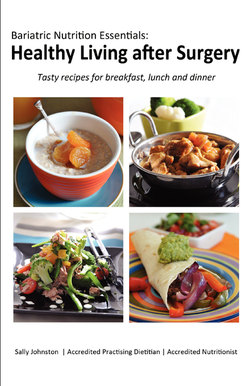Читать книгу Bariatric Nutrition Essentials: - Sally Johnston - Страница 6
На сайте Литреса книга снята с продажи.
ОглавлениеHealthy Living after Surgery
It is now that the real journey begins. It is now up to you to put in place the healthy lifestyle to achieve your goals.
For people who have had bariatric surgery, the journey to better health involves losing a significant amount of weight. This is not always easy on your own.
Studies show that those who regularly attend more follow‐up appointments with their team, including the dietitian, lose more weight. Follow up with your whole team is important, not just your surgeon.
“You have to stick with it if you want it to work.”
– Ricky, banded July 2009 –
What can a Dietician do?
Dietitians don’t just help people lose weight. Some people who have bariatric surgery will have medical conditions with specific dietary needs. Only an Accredited Practising Dietitian (APD) or Registered Dietician (RD) is qualified to advise on the nutritional management of chronic health conditions such as diabetes, heart disease, gastrointestinal disorders and food allergy and intolerance.
APDs/RDs can educate patients, families, partners and carers on life after bariatric surgery, including:
§ Obtaining all the nutrients needed for good health
§ Managing specific health conditions
§ Vitamin and mineral supplementation
§ Practical meal ideas
§ Meal planning and shopping
§ Reading and understanding food labels
§ Appropriate food preparation methods.
Long‐term success with a gastric band involves changes to many aspects of your life. If your surgical team does not include an APD/RD, ask for a referral to one.
